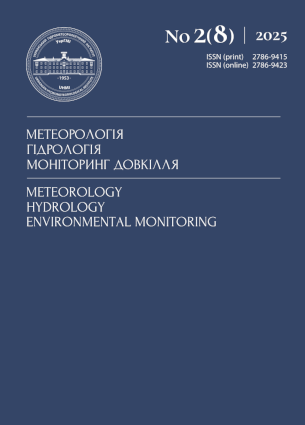Publication ethics
The editorial and publishing ethics of the journal ”Meteorology. Hydrology. Environmental Monitoring” are based on universal moral principles to be applied in the scientific editorial process. Key aspects of this ethics involve upholding ethical norms in regulating relations among all participants in the process: authors, editorial board, editors, and reviewers.
The editorial board of the journal ”Meteorology. Hydrology. Environmental Monitoring” supports Elsevier's Publishing Ethics policy aimed at aligning this publication with the principles of publishing ethics and adheres to the guidelines of the Committee on Publication Ethics (COPE) https://publicationethics.org/.
The regulatory and legal support for the implementation of the principles of academic integrity in the field of publishing in Ukraine is regulated by the following documents:
- The Civil Code (CC) of Ukraine, which defines the provisions on the objects and subjects of copyright, the emergence of copyright, personal non-property and property rights of the author, the use of the work, the term of validity of intellectual property rights to the work, etc.
- The Law of Ukraine “On Copyright and Related Rights”, which enshrined special rules regarding subjects and objects of copyright, copyright protection of a part of the work, emergence and exercise of copyright, presumption of authorship, non-property and property rights of the author, works for hire, copyright in collections and other composite works
- The Law of Ukraine “On Education”; special laws of Ukraine “On Higher Education”, “On Vocational Education” and “On General Secondary Education” which define academic integrity and list cases related to its violation.
- The Law of Ukraine “On Scientific and Scientific-Technical Activities”, which defines the legal, organizational and financial principles of functioning and development in the field of scientific and scientific-technical activities.
- Regulatory acts of the Cabinet of Ministers of Ukraine and central executive authorities that have scientific institutions under their jurisdiction.
- Statute and other internal regulations of the Ukrainian Hydrometeorological Institute of the State Emergency Service of Ukraine and the National Academy of Sciences of Ukraine.
Academic integrity (according to Article 42 of the Law of Ukraine “On Education” https://zakon.rada.gov.ua/laws/show/2145-19#Textis a set of ethical principles and rules defined by law that should guide participants in conducting scientific activities in order to ensure confidence in the results of scientific achievements.
Publication Ethics and Academic Integrity consists of the following parts:
Responsibility of the authors.
- objective evaluation of the results of own research;
- presenting only own scientific results in the work covering original research (does not apply to review articles and articles of the “hypothesis and theory” type);
- compliance with the legislation on copyright and related rights;
- providing reliable information about research methods and results, sources of information used and own research activities;
- references to sources of information in case of using ideas, developments, statements, information obtained by other authors;
- at the discretion of the authors, expressing gratitude to employees, managers, scientists, experts who were not directly involved in writing the article, but provided: laboratory analytical work, field research, measurements and observations, financial and organizational support, material and technical base for research, provided preliminary expert assessment or useful advice on the content of the article, etc.
Responsibility of reviewers.
- adherence to the basic principles declared in the purpose of the publication: scientific, objective and professionalism;
- objective evaluation of the results;
- “blind” review by two independent reviewers from different institutions;
- unbiased, objective assessment of the article submitted for consideration;
- self-critical attitude to one's own competence in relation to the issues discussed in the article and refusal to evaluate the article if the work is beyond the reviewer's professional competence;
- – providing not only comments on the inadmissibility of certain provisions and/or the general idea of the article, but also reasonable explanations for such decisions and advice on how to improve the content (additions, reductions) and correct errors;
Responsibility of editors.
- involvement in the review of articles,
- checking all submitted articles for anti-plagiarism;
- in the case of the first, possibly not realized, violation of academic integrity on other items from the above list, the article may be rejected for publication by the decision of the Editorial Board. In case of repeated violation, the author(s) is deprived of the right to publish in the journal for 5 years;

